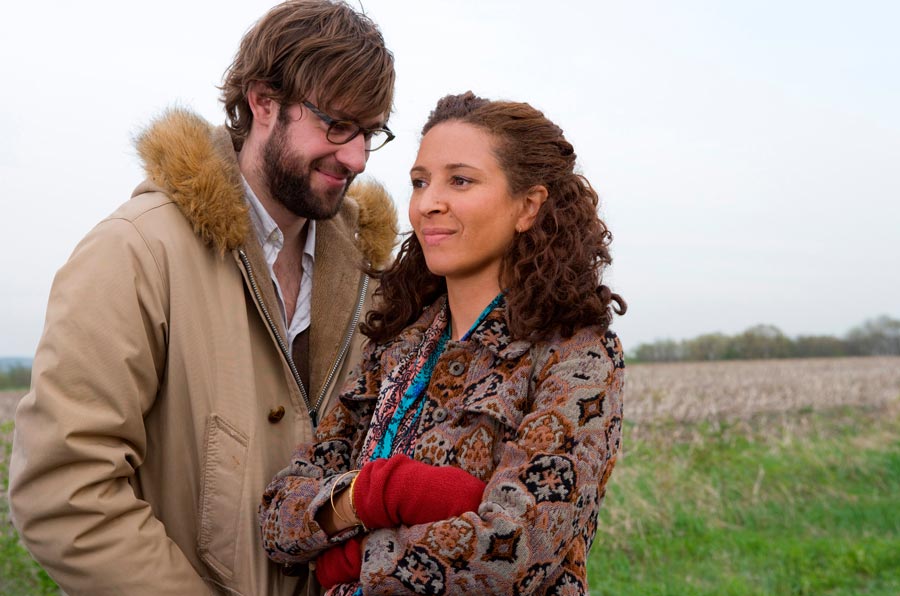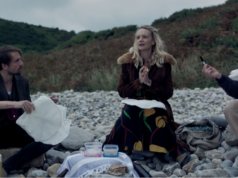Away We Go is directed by Sam Mendes, but you’d never guess that this scruffy comedy was by the same guy whose previous dramas Revolutionary Road and Road to Perdition were as meticulously arranged as any fashion show and about as spontaneous. This movie begins with Burt (John Krasinski) performing oral sex on his longtime girlfriend Verona (Maya Rudolph).
Mendes films this with his trademark delicacy, and in this context it’s funny: the angle of the shot, the conversation that takes place between Verona and Burt’s head (which is covered up by bedclothes), and Verona’s unexpected reaction when Burt suggests she might be pregnant. That sets the tone for this antic, occasionally annoying film that nevertheless stands as the best thing Mendes has ever made.
 The story picks up later, with Verona six months into her pregnancy, though the running joke is that she’s so huge that everyone thinks she’s eight or nine months along. When Burt’s parents (Jeff Daniels and Catherine O’Hara) arbitrarily decide to move to Belgium, the couple realizes that they’re lucky enough to have jobs that can be done from anywhere. (He sells insurance futures, she draws illustrations for medical textbooks.) Free to relocate wherever they choose, they crisscross the continent looking up old friends and relatives while trying to decide whether they’d be happiest raising their child in Phoenix, Tucson, Madison, Montreal, or Miami. More than that, they’re both looking for some sort of direction to their lives, and they’re not sure whether having a baby will give them that. Verona seems marginally more aware of the fact that they’re drifting through their lives and wonders aloud, “Are we fuck-ups?”
The story picks up later, with Verona six months into her pregnancy, though the running joke is that she’s so huge that everyone thinks she’s eight or nine months along. When Burt’s parents (Jeff Daniels and Catherine O’Hara) arbitrarily decide to move to Belgium, the couple realizes that they’re lucky enough to have jobs that can be done from anywhere. (He sells insurance futures, she draws illustrations for medical textbooks.) Free to relocate wherever they choose, they crisscross the continent looking up old friends and relatives while trying to decide whether they’d be happiest raising their child in Phoenix, Tucson, Madison, Montreal, or Miami. More than that, they’re both looking for some sort of direction to their lives, and they’re not sure whether having a baby will give them that. Verona seems marginally more aware of the fact that they’re drifting through their lives and wonders aloud, “Are we fuck-ups?”
The script is by married novelists/first-time screenwriters Dave Eggers and Vendela Vida – she wrote And Now You Can Go and Let the Northern Lights Erase Your Name, and I believe he’s written a few things, too. The construction of the story is episodic, with each section of the film labeled according to the couple’s location. The first two are as broad as any sitcom and give you a misleading idea of what’s in store. In Arizona, the couple endures the hospitality of a hard-drinking friend (Allison Janney) whose genial façade soon gives way to openly insulting her sad-sack husband (Jim Gaffigan) and overweight kids.
There’s an even more off-key interlude with Maggie Gyllenhaal portraying LN (pronounced “Ellen”), a smothering academic New Age mom who flips out when Burt tries to give her the gift of a baby stroller. (“I love my babies! Why would I want to push them away from me?”) Burt and Verona pay back LN for her condescending treatment in a very funny way, but the depiction of LN’s approach to childrearing is cartoonish, and Gyllenhaal isn’t suited to the type of acting needed here. These chapters leave you wondering how people as nice as Burt and Verona wound up with such horrible friends.
It’s only when Burt and Verona reach Montreal and reconnect with their much nicer married college pals, Tom and Munch (Chris Messina and Melanie Lynskey), that the movie gains real traction. Burt and Verona’s insular hipness is brought up short by Tom and Munch’s ongoing inability to have children of their own, and the writers hauntingly portray the hole that this creates in the other couple’s lives that nothing will ever fill, not even their four adopted kids whom they shower with affection. The actors give wrenching performances here, and Messina has a monologue in a karaoke club that’ll stay with you.
This leads into a remarkable scene on a backyard trampoline where Burt and Verona reaffirm their commitment to each other and their unborn child. Krasinski sports a full beard and glasses, which makes him look quite a bit older than he does on The Office. He gives his usual charmingly gawky performance here, and nowhere is he funnier or more winning than when Burt’s soothing a distraught Verona over her pregnancy weight. (“I’ll still love you if you’re so fat that I can’t find your vagina!”) The real revelation, though, is Rudolph, whose work here bears little resemblance to her freaked-out Saturday Night Live impressions of Donatella Versace and Whitney Houston. She’s quietly magnetic in her portrayal of this soft but resilient woman, and she provides the movie’s most moving moment at the very end, when Verona dissolves into tears of joy upon finding the right place to make a home. It’s a perfect way to end this imperfect movie. Away We Go may only be half of a great film, but I’ll take that over a whole mediocre film any day.











